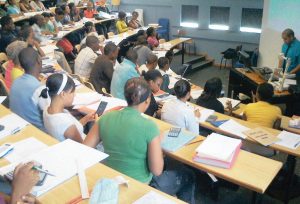Harrison and Gilmore (as cited in Dietz & Henrich, 2014) found that students self-reported texting not only in class, but also at work, while taking a shower, attending a religious service, and even while having sex!
And many researchers have by now found that texting in class decreases grades.
Students who text while studying take longer to finish the passage, and have other detriments in their studying – but don’t necessarily do badly on their exam. But in class, you can’t pause your instructor in the midst of a class the way you can pause your reading. So students who text in class must “multi-task” – attend to the lecture content (a verbal and auditory task) at the same time as they attend to the text they are receiving (a verbal reading task) or sending a text (a verbal task combined with a physical skill). We’ll talk about why this is difficult – or actually cognitively impossible – in a later post.
In the meantime, Dietz and Henrich (2014) surveyed students and also conducted a texting/lecture experiment to see if students would show a learning deficit if texting in class. They found that students in their study:
- agreed that texting in class was distracting in general
- but did not agree that they would be distracted if they texted in class!
- and they admitted they did text in class; thought the university policies about it wouldn’t stop students; and in fact believed that students should be allowed to text in class
However, Dietz and Henrich’s (2014) experiment found that texting “has a strong effect…on the grade outcome” (p. 165). After a lecture, they tested the students to compare the test scores of a non-texting control group to a texting experimental group. The average of the non-texting control group was 71% on their subsequent test (B-), a bit higher than average. The average of the texting group was 58%, a D. 🙁 significantly below average.
So – texting during the lecture – and your grades tank. To below average. Significantly below.
Do you believe me? Students often believe that they are somehow uniquely able to multitask, in class, or while driving, or at work, or during sex even while others can’t. Because they are not as distractable as others, or because they are more experienced and skillful texters, or because they are smart enough to do both tasks at the same time, or because their generation is able to do what older students couldn’t.
But – well – no. Dietz and Henrich (2014) study included these variables, and found that NONE of these variables predicted performance on the test.
We call this the Attribution Effect – with the attribution biases, the Fundamental Attribution Error (FAE) and the Self-Serving Bias (SSB).
How does this work? If we don’t catch ourselves, we all tend to fundamentally 🙂 believe that another’s bad behaviour or failed performance is because of internal factors (their lack of intelligence, or personality, or willpower), and their successes are because of external factors (must have been an easy test).
But we attribute our own mistakes or failures to external factors (I got a D on the test because of the stupid teacher’s stupid test), and our success to internal factors (I got a B because I’m smart, or studied). (Called the Self Serving Bias, for obvious reasons).
And, needless to say, this bias is an illusion to protect our self-esteem. Trust the experimental evidence, not the attribution error. And the research is clear. Texting in class doesn’t just lower your fellow students’ grades. It lowers yours as well.
Reference
Dietz, S. & Henrich, C. (2014). Texting as a distraction to learning in college students. Computers in Human Behaviour, 36, 163-167. doi: 10.1016/j.chb.2014.03.045

Leave a Reply